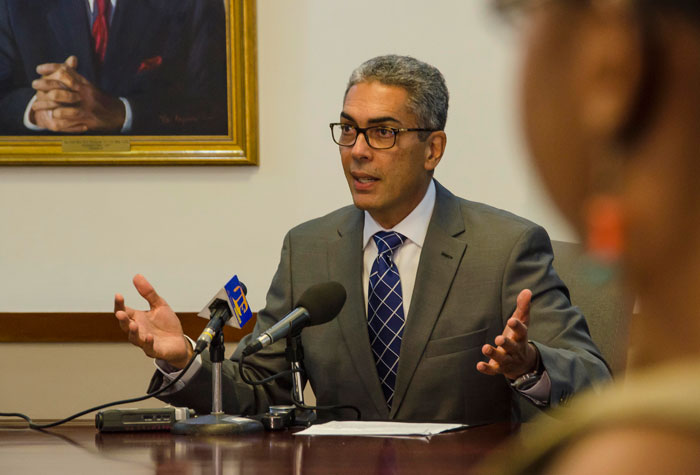Jamaica Surpasses All IMF Targets for First Quarter
By: , August 14, 2014The Key Point:
The Facts
- Mr. Byles, who was addressing the EPOC’s monthly press briefing on August 14, reported significant performance in the country’s primary balance and Net International Reserves (NIR).
- The primary balance for the quarter, which ended June 2014 was $18.5 billion, $3 billion better than the target of $15.5 billion, while the NIR stood at US$1.37 billion, which is US$219.4 million more than targeted.
The Full Story
Co-Chair of the Economic Programme Oversight Committee (EPOC), Richard Byles, says Jamaica surpassed all the critical targets under the Extended Fund Facility with the International Monetary Fund (IMF), at the end of the first quarter of the current fiscal year.
Mr. Byles, who was addressing the EPOC’s monthly press briefing on August 14, reported significant performance in the country’s primary balance and Net International Reserves (NIR).
The primary balance for the quarter, which ended June 2014 was $18.5 billion, $3 billion better than the target of $15.5 billion, while the NIR stood at US$1.37 billion, which is US$219.4 million more than targeted.
Tax revenue for the quarter ending June 2014 also surpassed the target, and was $1.5 billion more than the target of $80.0 billion. This resulted from improved performance in PAYE tax as well as tax on interest and Special Consumption Tax (SCT).
“So, all in all a good quarter in respect of the IMF targets,” Mr. Byles noted. He added that at the end of July, further improvements were observed in the NIR. “That number now stands at $2.18 billion and that is as a result of the successful floating of the US$800 million,” Mr. Byles said.
He explained that this puts the Bank of Jamaica (BoJ) in a very confident position of safety against any national or international adverse event.
The EPOC co-chair also reported that at the end of the reporting quarter, the Government spent $6.3 billion less than budgeted on wages, programmes and capital projects. However, he projected that spending on wages and capital projects is likely to pick up soon.
There was also noticeable improvement in the country’s fiscal deficit, which at the end of the quarter stood at $14.2 billion. This was $2.8 billion better than the budgeted deficit of $17 billion. A fiscal deficit occurs when the Government’s total expenditure exceeds the revenue it generates.
Mr. Byles also told journalists that the EPOC is happy with the latest data by the Statistical Institute of Jamaica (STATIN), which is showing 0.1 per cent inflation for June 2014 and a net increase of 5,600 in the employment figures as at April 2014.
“This is quite fundamental, because in the final analysis what we are really trying to do in this economic management is to provide jobs, so that people and families can live and better their lives,” he said.
Mr. Byles added that this is an indication that the improvements in the economic statistics, such as the primary balance, revenues and NIR are trickling down to result in growth in employment.
The EPOC Co-Chair said more attention will continue to be placed on ensuring further reduction in the unemployment figures.
He said that having met the June 2014 quantitative performance criteria, the EPOC is expecting a positive staff review from the IMF board later this month.
“I expect that based on the data that has been published by the Ministry of Finance and the Bank of Jamaica, we will pass this IMF review,” Mr. Byles asserted.
“The positive results we are seeing….all are pointing in the same direction, and that direction is an economy that is turning, becoming more efficient and producing some growth and for that we are quite pleased,” he added.




